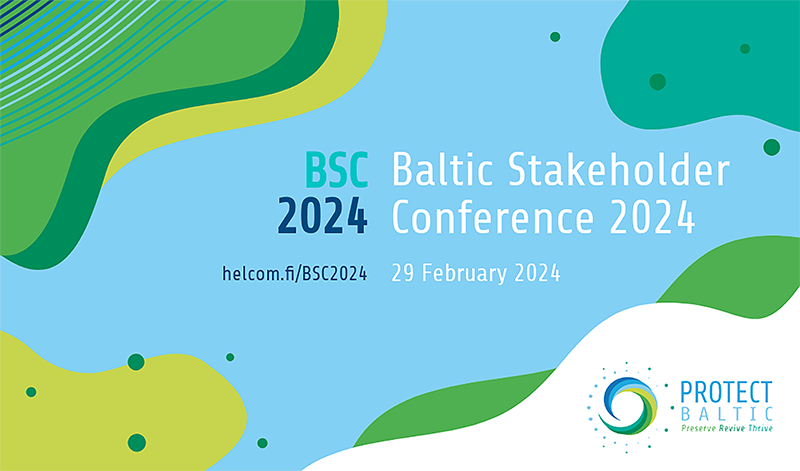
The Baltic Stakeholder Conference 2024 (BSC2024) took place on 29 February 2024 and was the inaugural stakeholder event for the PROTECT BALTIC project. The conference was conducted in a hybrid format, enabling both in-person and online attendance, with the in-person component held at:
HANAHOLMEN Swedish-Finnish Cultural Centre
Hanasaarenranta 5
FI-02100 Espoo
Alongside the main conference, a youth event was held online to actively engage young individuals in discussions on the future of the Baltic Sea, the challenges it faces, and to provide an introduction to the PROTECT BALTIC project.
Registration
Registration for the event is closed. More than 330 participants registered to join, with over 230 attending the event.
Memo
The full report from the event is available here.
MPA Europe’s regional stakeholder report is available here.
Programme (links to presentations and recordings will be available after the event)
Moderator: Rogier Elshout, Moderating.EU, The Netherlands
In total, 21 workshops took place: each workshop session had an in-person and online component, along with the online youth conference.
Recordings of the online sessions as well as the opening and closing plenary are available in the agenda links.
| Time | Baltic Stakeholder Conference 2024 | Youth Conference: Challenge the status quo: redefine our relationship with nature |
| 09:00-10:00 | Registration (coffee, tea and refreshments included) | |
| 10:00-11:00 | Opening plenary Introduction to PROTECT BALTIC Jannica Haldin, HELCOM EU Missions Restore our Ocean and Waters Eduardo Carquejeiro, Directorate-General Research and Innovation | |
| 11:00-13:00 | Block 1: Workshop sessions | Youth conference Facilitated by Rogier Elshout, Moderating.EU How can we redefine our relationship with nature? What are we at risk of losing? What is the Baltic Sea worth to you? |
| Management Updating management guidelines for marine protected areas (MPAs), developing a methodology for management effectiveness assessment and testing it in national case studies. Summary of management workshop | ||
| Spatial modelling Creating high-resolution environmental datasets for the Baltic Sea and project future species and habitat distributions to inform conservation and management strategies. | ||
| Ecosystem services Developing a versatile methodology to assess, map and value ecosystem services. The project will inform marine conservation, optimize marine spatial protection for MPAs and other effective area-based conservation measures (OECMs), and identify key areas for ecosystem service production, demonstrating their socio-economic value and guiding future assessments. Summary of ecosystems services workshop | ||
| Legal frameworks for planning marine spaces Assessing and aligning international and EU legal frameworks with Baltic Sea Action Plan targets, evaluating compatibility with directives such as the Birds and Habitats, Marine Strategy Framework, and Common Fisheries Policy. | ||
| MPA Portal Building and updating a regional portal with information on MPAs and OECMs. Employing agile development methods, the process ensures alignment with the needs of MPA managers and users, integrating key functionalities and data models to enhance regional capacity in marine protection. | ||
| 13:00-14:30 | Lunch (included) | Lunch |
| 14:30-16:30 | Block 2: Workshop sessions | Youth conference continues |
| Restoration Contributing to the development of a Regional Restoration Action Plan and toolbox, highlighting regional priorities, methods, costs, and feasibility in regard to restoration efforts. Summary of restoration workshop | ||
| Governance Fostering a shared regional understanding of marine spatial protection, establishing common terminology and setting ecologically relevant protection targets and indicators. It also identifies threats and pressures on ecosystems and assesses the efficiency of existing protection measures. | ||
| Monitoring Reviewing the existing monitoring systems for marine spatial protection in the Baltic Sea, exploring innovative monitoring tools and methods, and developing a comprehensive framework and guidelines for the entire MPA network. | ||
| Ecological coherence Revising criteria for assessing the coherence of marine spatial protection, aligning them with scientific knowledge and environmental goals, and develops connectivity models to understand species and habitat interactions. The work assesses the MPA network, emphasizing representativity, replication, adequacy, and connectivity, with a focus on species and habitat distribution. | ||
 | MPA Europe Baltic Sea Regional Stakeholder workshop MPA Europe presented their results to date on classifying marine ecosystems, modelling species and habitat distributions and mapping blue carbon stores. They will also invite stakeholders to begin to co-identify use cases for their maps, final atlas and results. | |
| 16:30-17:00 | Coffee, tea and refreshments (included) | Coffee and tea break |
| 17:00-17:55 | Closing plenary Summaries of the workshops Presentation of AI video | Closing plenary Summary of youth event |
| 17:55-18:00 | Closing of the conference | Closing of the conference |
The Baltic Sea: A sustainable future – by you
At our Baltic Stakeholder Conference 2024, we asked our audience two simple questions:
1. What is their ideal future for the Baltic Sea?
2. What is the role of protected areas in achieving this ideal?
With the help of AI, here is the result from their input:
